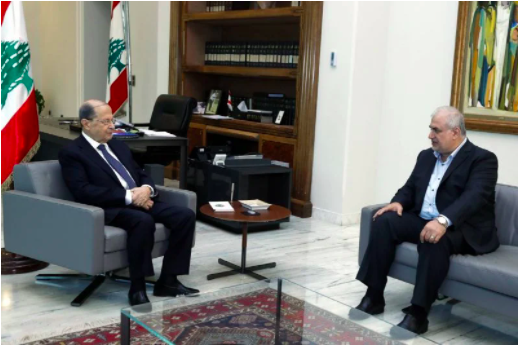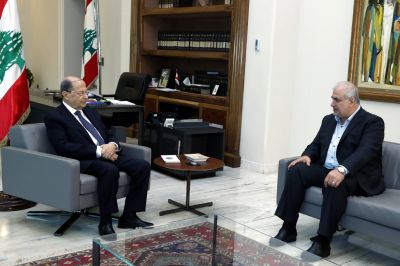
Michel Aoun receiving the leader of the Hezbollah parliamentary group Mohammad Raad in Baabda, Sept. 15, 2020. (Credit: Dalati and Nohra)
After having maintained a rather ambiguous position over the demarcation of the maritime border with Israel, Hezbollah has recently made sure to convey a clear-cut message: it has the upper hand in this dossier.
On Monday, Mohammad Raad, head of Hezbollah’s parliamentary bloc, confidently said that Lebanon will not give up a single drop of water to which it is entitled, and that otherwise, the gas will remain buried where it is.
The message is clear: it is Hezbollah that will steer this sensitive issue.
This new position was all the more surprising since the pro-Iran party had, since the start of the talks, shown its willingness not to stand in the way of the state when it comes to the negotiations and any ensuing decisions. It appeared that the Lebanese government enjoyed a certain leeway in handling the issue, albeit subject to the party’s behind-the-scenes approval on the progress of the talks.
President Michel Aoun, who has managed to retake hold of this issue that has been, for a long time, the prerogative of Parliament Speaker Nabih Berri, placed himself at the heart of the negotiations.
Lately, Aoun appeared to have made concessions on Lebanon’s claims, renouncing the s0-called maximalist demands that he had been clinging to for months.
At the beginning of February, the head of state confirmed that “Line 23 is our maritime border,” instead of the Line 29 that the negotiators had initially defended, and which gives Lebanon an additional 1,430 square kilometers.
Aoun’s stance caused an outcry, especially among his detractors who accused him of using the maritime demarcation in a bid to remove the American sanctions against his son-in-law and Free Patriotic Movement leader, Gebran Bassil.
Until then, Hezbollah was watching the developments in silence, which some interpreted as a sign of consent.
On March 1, the Shiite party set the record straight.
“The American mediator [Amos Hochstein] in the gas exploration talks has recently visited Lebanon in an attempt to play the cunning fox, trying to divide the cake between the opposing parties,” Raad said.
“I am telling you that our gas will remain buried in our sea until Israel is prevented from touching a drop of water on our shores,” he added, making a thinly veiled threat against the Jewish state, which, according to the Lebanese MP, will not be able to explore for gas in an area close to “our maritime zone.”
‘Electoral motives’
“Hezbollah has made up its mind. The party decided to clear up the confusion regarding its position,” an analyst close to the March 8 camp told L'Orient-Le Jour on condition of anonymity.
Several reasons could be behind this escalation of tone.
Raad’s virulent remarks could be explained by “electoral motives,” according to Karim Bitar, a political scientist, who said that Hezbollah had gone as far as to say that the May parliamentary elections are tantamount to a “political July war,” in reference to the 2006 war between the party and Israel.
The maximalist demands for Lebanon’s rights are undoubtedly one way to fuel anti-Israeli national and patriotic sentiments.
“Hezbollah is trying to harness the sectarian sentiments to reassert its legitimacy against Israel and mobilize its popular bases two and a half months before the elections,” Bitar said.
The maritime demarcation issue has become a “trump card” not only for Hezbollah vis-à-vis its public, but also for the different civil society groups who have made it their hobby-horse in recent weeks.
In Paris as well as in Beirut, spontaneous demonstrations were held to denounce the president’s position deemed as a maneuver to sell off Lebanon’s rights. The news was quickly relayed by MP Paula Yaacoubian and Laury Haytayian, a Lebanese oil and gas expert, both of whom are running in the May elections.
Raad, for his part, did not hold back in taking a jab at the head of state, without naming him.
“We say no to any short-term political settlement. No to any compromise made in order to serve personal interests,” Raad said.
With these words, the head of Hezbollah parliamentary bloc appeared to dissociate himself from his ally. This change of heart is all the more surprising because the president could not in any case venture to express his willingness to make concessions in relation to this file without the green light from the Shiite party, according to Bitar.
Aoun dressed down
According to sources close to Hezbollah, Berri’s silence on the president’s proposal could be interpreted as consent, since he never explicitly expressed his approval to the maximalist demands, which means that Hezbollah was also in the loop.
“Hezbollah is also trying to dress down Michel Aoun for his recent position in the war against Ukraine,” the March 8 source said, in reference to the recent statements by the foreign minister, who is endorsed by Baabda, condemning Russia’s invasion of Ukraine.
This position is also probably dictated by narrow interests, which raised the ire of the Iranian-linked party.
Hezbollah’s change of tone vis-à-vis its ally can be also explained by other international developments. For Bitar, now that tensions have been running high on the international level, Hezbollah “would do everything to deepen polarization, a maneuver that serves its game.”
According to an analyst close to the Shiite party circles who did not want to be named, Hezbollah is probably seeking to slow down the negotiation process with Israel, pending a calmer regional and international situation, and the outcome of the Vienna nuclear talks.
“It will not make any concessions, especially since it is hoping that Lebanon would be in a better position when this showdown is over,” the source said.
Meanwhile, a senior Hezbollah official downplayed Raad’s remarks, stressing that his party’s position has not changed.
This article was originally published in French in L'Orient-Le Jour. Translation by Sahar Ghoussoub.
